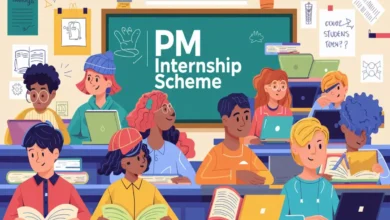Addressing the finale of the Smart India Hackathon, he said the National Education Policy 2020 facilitates inter-disciplinary study, which will ensure that the focus is on what the students want to learn.
“It is not just a policy document but a reflection of the aspirations of over 130 crore people. A large section of students feel they are judged on the basis of subjects in which they have no interest… often there is pressure from friends and families and they start studying a particular subject without interest,” Modi said.
“This approach has contributed to a population which is literate but what it has studied is of no use to it… despite having a pile of degrees, individuals feel incomplete and lack confidence which affects their whole life. The new education policy is an attempt to change this approach and bring systematic reforms in the education system by reforming the intent and content,” he added.
The prime minister said that the new NEP has been framed keeping in mind the aspirations of the youth of the 21st century of our country.
“The 21st century is the era of knowledge. This is the time for increased focus on learning, research, and innovation. This is exactly what India’s National Education Policy 2020 does. We are focussing on the quality of education in India. Our attempts have been to make our education system the most advance and modern for students of our country,” he said.
“The policy is about the spirit which reflects that we are shifting from the burden of the school bag, which does not last beyond school, to the boon of learning which helps for life, from simply memorising to critical thinking. The role of the youth is very important in achieving the goal of ‘ease of living’ to give a better life to the poor,” he added.
The NEP, approved by the Union Cabinet earlier this week, replaces the 34-year-old National Policy on Education framed in 1986, and is aimed at paving the way for transformational reforms in school and higher education systems to make India a global knowledge superpower.
Teaching up to Class 5 in mother tongue or regional language, lowering the stakes of board exams, a single regulator for higher education institutions except for law and medical colleges, and common entrance tests for universities are part of the sweeping reforms in the NEP.
Replacing the 10+2 structure of school curricula with a 5+3+3+4 structure, corresponding to age groups three to eight, 8-11, 11-14 and 14-18 years respectively, scrapping M.Phil programmes, and implementing common norms for private and public higher education institutions are among other salient features of the new policy.
“Languages of India will progress and develop further due to the changes brought in the education policy. This will not only promote knowledge and learning in the country, but will also strengthen its unity,” the prime minister said.
Hackathon is a non-stop digital product development competition organised by the HRD Ministry, where problems are posed to technology students to suggest innovative solutions.
“Smart India Hackathon is an initiative to identify new and disruptive digital technology innovations for solving the challenges faced by our country. This year, we will have more than 10,000 students competing to solve 243 problem statements from 37 central government departments, 17 state governments, and 20 industries,” a senior HRD Ministry official said.
Each problem statement carries a prize money of Rs 1 lakh except the student innovation theme which will have three winners, 1st, 2nd and 3rd, with prize money of Rs 1 lakh, Rs 75,000 and Rs 50,000 respectively, he added.
This is the fourth edition of the hackathon organised by HRD Ministry.
“As an outcome of Smart India Hackathons to date, around 331 prototypes have been developed, 71 startups are under formation, and 19 startups are successfully registered. Further, 39 solutions have already been deployed at various departments, and around 64 potential solutions have been funded for further development,” the official said.
Source: Yourstory




